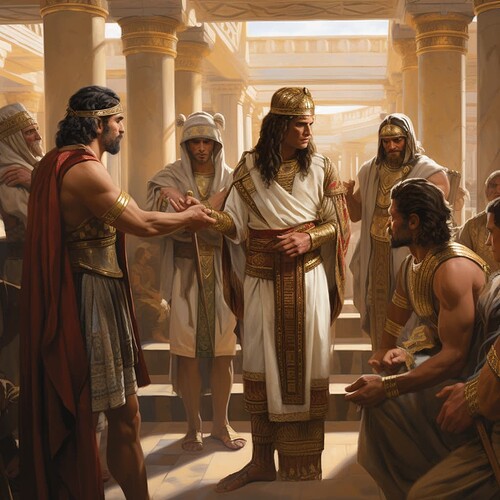![]() January 27: Genesis 44-45: Joseph’s Revelation and Reconciliation
January 27: Genesis 44-45: Joseph’s Revelation and Reconciliation
Unveiling Forgiveness and Family Restoration
![]() Introduction
Introduction
In today’s exploration, we engage with Genesis chapters 44 and 45, where the climax of Joseph’s narrative unfolds. We witness the emotional revelation of Joseph to his brothers and the powerful theme of reconciliation that ensues, offering profound insights into forgiveness and the restoration of familial bonds.
![]() Genesis 44: The Final Test
Genesis 44: The Final Test
Joseph’s strategic framing of Benjamin brings his brothers to a moment of truth. This chapter challenges them to demonstrate their integrity and the authenticity of their repentance for past actions against Joseph.
![]() Key Verse: “Now then, please let your servant remain here as my lord’s slave in place of the boy, and let the boy return with his brothers.” — Genesis 44:33
Key Verse: “Now then, please let your servant remain here as my lord’s slave in place of the boy, and let the boy return with his brothers.” — Genesis 44:33
![]() Genesis 45: Joseph’s Revelation
Genesis 45: Joseph’s Revelation
The poignant revelation of Joseph to his brothers is a testament to his forgiveness and the fulfillment of the dreams he had as a youth. It is a moment of profound emotional release and a pivotal point in the saga of Israel’s patriarchs.
![]() Key Verse: “I am your brother Joseph, the one you sold into Egypt! And now, do not be distressed and do not be angry with yourselves for selling me here, because it was to save lives that God sent me ahead of you.” — Genesis 45:4-5
Key Verse: “I am your brother Joseph, the one you sold into Egypt! And now, do not be distressed and do not be angry with yourselves for selling me here, because it was to save lives that God sent me ahead of you.” — Genesis 45:4-5
![]() Key Themes and Reflections:
Key Themes and Reflections:
The Power of Forgiveness: Joseph’s forgiveness of his brothers’ betrayal is a powerful example of grace, highlighting the strength found in mercy and the healing that comes with it.
Providence and Purpose: The narrative reveals the divine providence at play, weaving together events for a greater purpose and the survival of a family that shapes a nation.
Reconciliation and Restoration: The reunion of Joseph with his family is a moving representation of reconciliation and the restoration of broken relationships, serving as a model for overcoming adversity through love and forgiveness.
![]() Today’s Application:
Today’s Application:
Consider the role of forgiveness in your own life and the impact it can have on healing and restoring relationships. Reflect on the ways in which life’s challenges may serve a higher purpose and how reconciliation can lead to growth and renewal.
![]() Hidden Gem:
Hidden Gem:
Did you know? The story of Joseph and his brothers is one of the earliest detailed narratives in literature that deals with forgiveness and reconciliation within a family, offering timeless lessons on human relationships and divine orchestration.
![]() Reflective Q&A:
Reflective Q&A:
![]() Genesis 44: The Final Test
Genesis 44: The Final Test
![]() Judah’s Plea: What does Judah’s plea for Benjamin reveal about his character and the change in Joseph’s brothers?
Judah’s Plea: What does Judah’s plea for Benjamin reveal about his character and the change in Joseph’s brothers?
A: Judah’s willingness to sacrifice his own freedom for Benjamin’s reflects a profound change of heart and a deep sense of responsibility, showcasing the transformative power of remorse and redemption.
![]() Testing Integrity: How does the final test placed upon Joseph’s brothers serve the larger narrative of his story?
Testing Integrity: How does the final test placed upon Joseph’s brothers serve the larger narrative of his story?
A: The test not only reveals the true repentance of the brothers but also sets the stage for Joseph’s revelation, acting as a catalyst for the emotional and spiritual resolution of past grievances.
![]() Genesis 45: Joseph’s Revelation
Genesis 45: Joseph’s Revelation
![]() Joseph’s Emotional Reveal: How does Joseph’s approach to revealing his identity shape our understanding of forgiveness?
Joseph’s Emotional Reveal: How does Joseph’s approach to revealing his identity shape our understanding of forgiveness?
A: Joseph’s reveal, coupled with his immediate reassurance and emphasis on divine providence, illustrates a mature and compassionate approach to forgiveness, prioritizing healing over retribution.
![]() The Role of Divine Providence: In what ways does the story of Joseph affirm the belief in divine providence and its influence on personal destiny?
The Role of Divine Providence: In what ways does the story of Joseph affirm the belief in divine providence and its influence on personal destiny?
A: Joseph’s interpretation of his journey as divinely orchestrated to preserve life affirms the belief in a purposeful divine influence that guides life’s events beyond human understanding or control.
![]() Join the Discussion:
Join the Discussion:
How does Joseph’s story influence your perspectives on forgiveness, providence, and family? Engage with us and share your insights in the comments below!
#Joseph #Forgiveness #Providence #Reconciliation #Family #BibleStudy #GenesisReading
![]() Continue the Journey in Genesis: Stay with us as we delve deeper into the richness of Genesis and the enduring legacy of its teachings.
Continue the Journey in Genesis: Stay with us as we delve deeper into the richness of Genesis and the enduring legacy of its teachings.
![]() Subscribe to our Newsletter!
Subscribe to our Newsletter!
Immerse yourself in our daily readings and thought-provoking insights. Join our community and stay connected with the latest discussions:
![]() Enrich Your Inbox with AIgniteScripture: Get the best of our reflections and community contributions with our newsletter. Sign up here and be part of a collective spiritual journey: https://newsletter.aignitescripture.com/
Enrich Your Inbox with AIgniteScripture: Get the best of our reflections and community contributions with our newsletter. Sign up here and be part of a collective spiritual journey: https://newsletter.aignitescripture.com/
